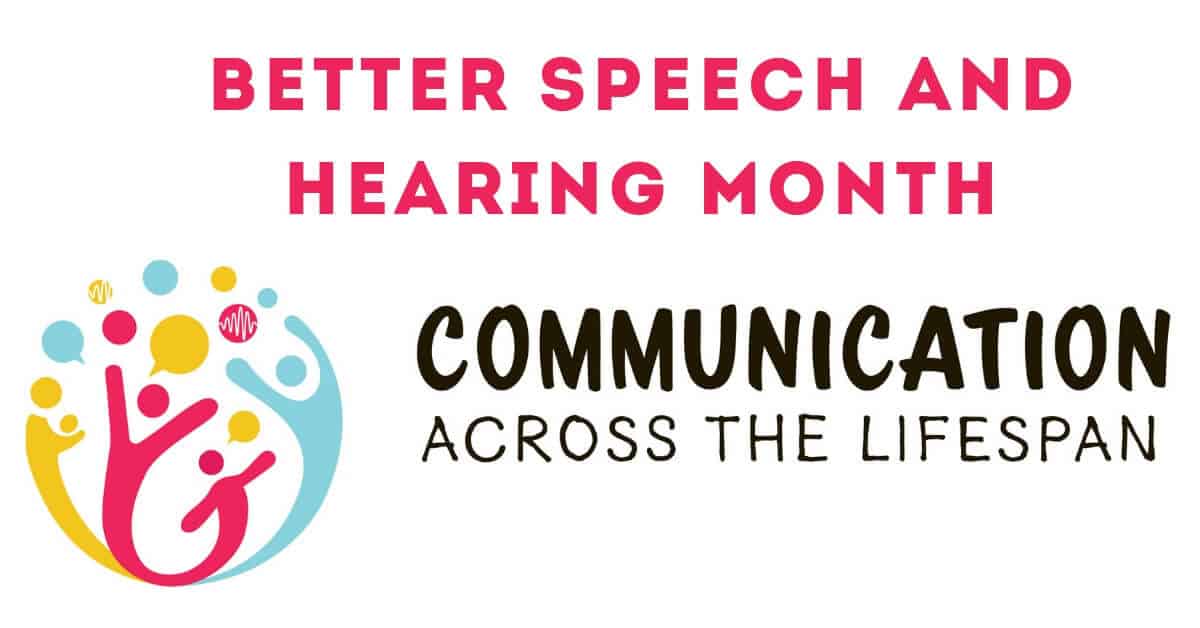- Alcohol and Hearing Health - April 9, 2025
- How Smoking Can Harm Your Ears - March 11, 2025
- Succeeding in the Workplace with Hearing Aids - February 10, 2025
Each May, the American Speech, Language, and Hearing Association (ASHA) celebrates Better Speech and Hearing Month, in an effort to increase awareness about communication disorders and hearing impairments as well as inspire action in the community. For 2019, the theme is “Communication Across the Lifespan”.
Communication Across the Lifespan
Most of us can agree that communication is one of the most important foundations to a happy life full of healthy relationships. Communication begins on our very first day of life and continues until our very last breath. Whether consciously or unconsciously, we are consistently communicating our wants, needs and feelings to the people and the world around us. Whether you are 4 or 40, communication is important, and it is imperative that we learn about speech and communication milestones and difficulties, to help ensure we seek intervention for ourselves or our loved ones if we notice issues.
Communication Disorders in Infants
Although it may be difficult to identify in very young infants, communication occurs from our first day of life. Infants who are achieving appropriate speech, language, and hearing milestones will smile and interact with others from just a few months old. At about 4-7 months old, infants should be able to babble and make various sounds with their mouths. When it comes to hearing, infants should react to and look towards noises or music. Through months 7-12, infants should begin to respond or react when they hear their name. If an infant in your life has not reached these milestones, it may be time to schedule an appointment with an audiologist, especially if the child did not pass or did not receive an infant hearing screen. Learn more about the signs in infants by visiting: https://identifythesigns.org/signs-of-speech-and-language-disorders/
Communication Disorders in Toddlers/Preschoolers
After infancy, babies begin rapidly developing their speech and communication skills. By about 1.5-2 years of life, babies should be able to string simple words together to make short sentences, and will be able to follow simple one or two-step instructions. By about 2-3 years, toddlers should be able to interact and play with and alongside other children their age. At around 2.5-3 years old, children should begin developing early reading skills, such as identifying letters and pointing to and naming pictures in a familiar story. If a toddler is not reaching these milestones, it is important to reach out to a specialist or their pediatrician. Parents can also implement their own interventions by increasing the amount of time they spend reading aloud to their children and making an effort to continuously converse with them about what you are doing and what they are doing. Learn more about the signs by visiting: https://identifythesigns.org/signs-of-speech-and-language-disorders/
Communication Disorders in School Aged Children
Once children reach kindergarten, they should be able to follow simple, yet wordy directions such as, “get the box of crayons, find some paper, and pick out three colors”. They should also be able to tell a short story in their own words and speak differently in different circumstances. For example, kindergartners may use shorter and simpler words when speaking with younger children and may speak louder when they are outside versus inside. Beyond difficulty holding conversations with peers and adults, another sign of communication or hearing disorders in school aged children is a lack of or very slow progress in reading and/or math. Parents may contact the school to provide assessment into possible disorders or may schedule an appointment with an audiologist or speech language pathologist.
Communication Disorders in Adults
Hearing loss currently affects one-in-five teenagers and half of all adults over the age of 75. If you have noticed some changes in your communication, the reason may be untreated hearing loss. Some of the most common signs of hearing loss in adults is a withdraw from social situations you used to find enjoyable, increase in miscommunication while conversing, or a feeling that those around you are mumbling. It may also feel as though you can hear what people are saying, however, you are simply unable to fully understand them.
Blue Wave Hearing Centers
If you are experiencing these or any other signs of hearing loss, reach out to our friendly team today. We would love an opportunity to work with you and help you on your journey to improved hearing.


